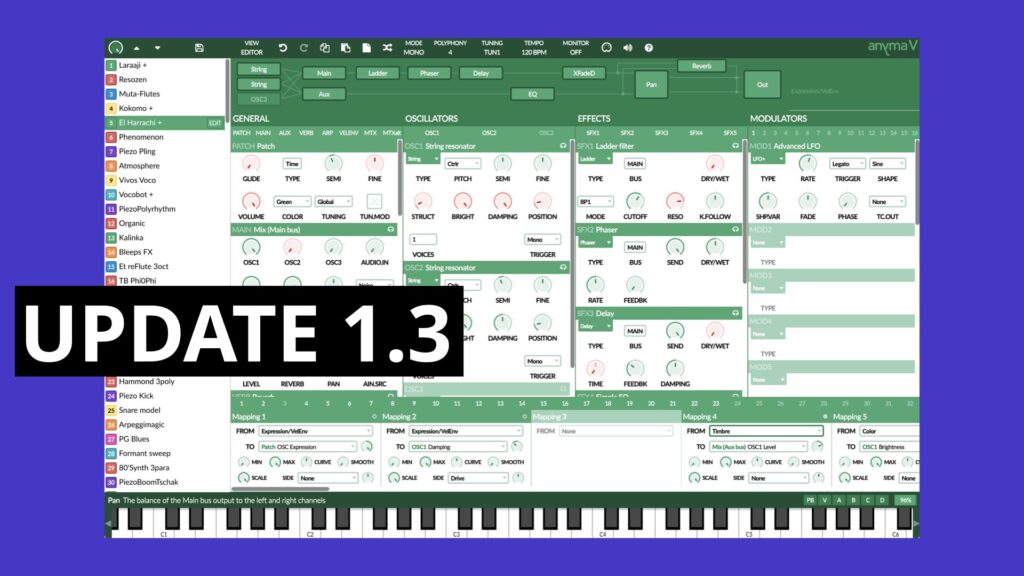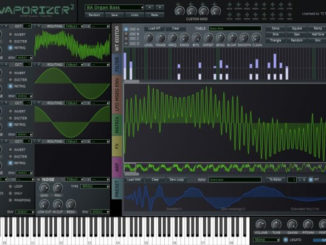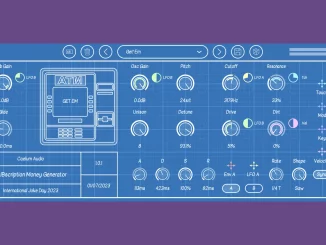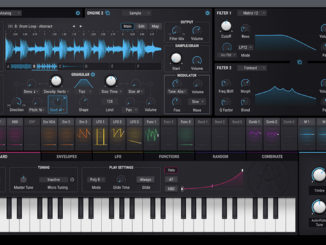Aodyo Anyma V is a software version (VST3/AU plugin) of the Anyma Phi physical modeling Synthesizer with full polyphony.
Today, the hardware Anyma Phi physical modeling Synthesizer received a final update with new features. The Anyma V Synthesizer plugin also received a last and final feature update, 1.3, that you should download and save for the future.
The new features are similar to those in the hardware firmware 1.3.
Aodyo Instruments Anyma V 1.3
The new update brings various new features. One is user interface scaling options, which allow you to rescale the interface to your display.
The new seven oscillator models of the Anyma 1.3 hardware update are also available now in the plugin: Bass Brass, Flute, Clarinet, and Cylysax physical models and Bagpipe, Corroboree, and Overdrive guitar oscillators based on Stylophone presets.
Like in the hardware, they added a new detune parameter to the Artin X3 oscillator and an RT.Fine parameter to the Artin FM oscillator. They also increased the range of the Drawbar organ oscillator by one upper octave. They also added a new slow envelope modulator on the modulator side.
Also new is MTS-ESP client support for dynamic tuning and velocity envelope hard reset when a note is played. Other new features are:
- Separated MIDI mode settings into two Mono/Poly and Legacy/MPE switches, opening the possibility of mono-legato playing using a MPE controller.
- Replaced the Patch
TUN.MODparameter with a new polyphony mode parameter, allowing you to either follow the global setting, or to force poly or mono mode. - Singled out Morph in matrix mode presentation.
- Fixed a bug with Delay sync in polyphonic mode.
- Added a 0 st option for the pitch-bend range.
Further, you can explore 126 new patches in the factory library designed by Dan Maurer. Thanks for the donation, and thanks for this final update.
The new Aodyo Anyma V 1.3 update is free of charge and available on the official website’s forum. The developers also updated the licensing so that it also works during the next few years.
Article From July 24, 2024
Synthesizer development can take a long, especially if the company promises many deep features. This fits well with the Anyma Omega project from the French company Aodyo Instruments, which was 250% funded via Kickstarter in 2022. Almost two years later, the synth has not yet been delivered.
After a few setbacks (display/mainboard change…), development continues slowly, step by step. The team is currently working on the software implementation, including the GUI and the engine. For this purpose, they have designed a tool to stress test the code in all position situations. They ended up creating a software version of the Anyma Phi Synthesizer.
Latest Anyma Omega Update
In our last update, we mentioned our focus on the software/firmware foundations supporting GUI and patch edition. Meanwhile, we encountered some bugs in the synthesis engine, particularly with voice management and MIDI/MPE handling. Given the complexity of various controllers users might connect to their Omega Desktop, we decided to prioritize this issue first.
To address these challenges, we wanted a tool that allowed us to stress-test the code and ensure compatibility with different setups. We ended up creating a full-fledged virtual instrument called Anyma V, which is essentially the Anyma Phi editor tied to a polyphonic but monotimbral Anyma synth engine.
Aodyo Anyma V
Anyma V is the software counterpart to the Anyma Phi hardware Synthesizer. The engine is identical, but it’s polyphonic and monotimbral here. Good news for those who pre-order Anyma Omega on Kickstarter/Indiegogo. They will receive a free license to help them pass the time while they wait.
The virtual version of Anyma Phi offers the same super deep semi-modular multi-synthesis engine as the hardware.
It hosts three oscillator slots with 40+ OSC types, including wind/string physical models, modal resonators, and virtual analog and digital algorithms. Then, it has five customizable effects slots with more than 30 FX types, including resonators, granular processors, FM operators, reverb, and more.
The modulation engine also goes very deep. It has 16 modulator slots with 40+ selectable types, ranging from classic envelopes, LFOs, and utilities to sequencers and physical and algorithmic processors.
In the dedicated 32 mappings (destinations) slots, you can connect modulators, controllers, and more with any synth parameter from the engine, using virtual patch chords.
Clever, Anyma V shares the patch format, enabling seamless patch creation and transfer between both instruments. The hardware version lacked some patch content. I think the software version could bring a good amount of new content to the hardware, especially from third-party sound designers.
First Impression
I know this step from somewhere. Ah yes, Arturia and the MiniFreak and MiniFreak V. It’s a neat idea to open up the engine to more people. This way the synth gets more sound content and even musicians without hardware affinity can discover the engine. After a quick test, both the VST3 and AU versions are buggy. Bug reports are out. I hope they can quickly fix it.
Yes, the Anyma Omega is still a long way off. This is, however, a welcome “sorry” gift for those who pre-ordered it in 2022, including me. But hope that it comes to the market soon
Aodyo Anyma V is available now for an introductory price of 79€ instead of 159€. It runs as a standalone app and VST3 and AU plugin on macOS (native Apple Silicon + Intel), Linux and Windows. Kickstarter/Indiegogo backers of the Anyma Omega & Loom will get a free license. Check your e-mails for the coupon code.
If you are interested in Anyma Phi, Aodyo offers Anyma Phi at a special summer 30% OFF discount for 349€ instead of 499€ (RPP).
More information here: Aodyo Instruments







Crap software! Crashes in Logic and standalone makes no sounds.
I was actually thinking of getting one of their synths – not a chance in hell now!
Do you have a bad day? Instead of bullying, just send your crash log to the developers, and they will fix it. I don’t know 1 digital hardware or software synth that was not bug-free in version 1.0. Help instead of being a bad gu. Cheers
I was having a busy day, and so didn’t appreciate losing a chunk of it testing this on two computers when I could have been working on tracks. That said, you’re right and my response there was a bit dramatic.
If they were an entirely new company or if it were a minor bug I’d have been more sympathetic, but both the app and plugin are fundamentally broken on release – and that isn’t a good look at all for a company that already has synths out there in retail and currently planning to release one which costs over a grand.
Fact is, there isn’t really an excuse for even a small music tech company to release software which doesn’t even function in the most basic way and that criticism is entirely deserved. This is why software companies work with their community and beta testers.
Also, this isn’t just ‘buggy’ – it is BROKEN and I think you’ve a responsibility to your audience to report that honestly, just as much as I feel I’ve a responsibility to call out a company which is releasing untested products. Real shame as I’m a fan of this website and the excellent service it normally provides for the music tech community.
I have reached out to them and Jonathan has been both apologetic and clear about a planned update, which I’ll of course help with where I can. Let’s hope they can fix this and properly test releases in the future.
Are you sure this isn’t scamware?
No mention on the site and doesn’t work either in Logic or standalone.
Something VERY suspicious going on here.
it’s official. I help them to fix some bugs as it crashes on my system
Working for me in Studio One Pro. I’m a bit underwhelmed by the factory bank though.
there are not a lot of patches indeed, one of the downers of the synth so far, same on the hardware. But i hope the new soft version changes this a bit.
The plugin crashes Ableton Live 12 and the standalone version does not output audio on my system. I agree that all new software has some quirks, but this should have been tested a bit longer until they released it.
We know it now that it’s buggy 😉 Many people report it already. We don’t know which operation systems the developers have to test the plugin. Also, it’s their first “plugin” release. I’m pretty sure they will see soonish an update.
I’ve worked with plenty of small software developers, including a few music tech ones and all of them understood the need for working with their community and beta testing before release in order to avoid this kind of embarrassment.
Looks like they are working on a fix though – and if it’s any good I’m open to beta testing future versions.
got an Anyma already. lets go Omega!!!!
Version 1.2.1 fixes the crashes and various bugs reported. A bit of an embarrassing moment for us… None of them showed up on more than a dozen test machines during the last three weeks of testing and adjustments, but it should be a smoother sail from now on. Just download the version for your OS on the product page.
Aodyo has been quick in fixing a lot of the bugs.
I can say I’ve tested the new version on a PC running Windows 10, with Sonar DAW
MAC OS (14) with UA Luna
Both standalone and VST versions now work fine.
If you are familiar with the anyma phi editor the Anyma V has much the same feel.
Having always been interested in the Phi hardware, which is not available locally in Australia without importing myself, I jumped at this VST. Version 1.2.1 works great on my Intel Mac, both standalone and inside Cubase Artist 12, but required activating separately in each. No crashes yet!
I love the many, many different oscillators and effects offered by Anyma. It’s going to take me a long time to dig into all of its corners.
Looks like it is fixed now – and initial issues aside, it is a really dynamic and excellent synth and well worth it at the intro price.
I’ve been trying this on Windows 11 within Renoise and no crashes or buggy behaviour yet.
Version 1.2.1
It also sounds great btw.
So, obviously, it’s all bittersweet. Gifting us this softsynth based on alleged delays in manufacturing the devices we had backed through crowdfunding was a nice gesture, at the time. While the launch version was quite rough, they did correct most issues. And it’s given us access to sound design work done by Anyma Phi users. This update itself would have been great news, had the company been sustainable. Support for MTS-ESP was high on my wishlist, for a variety of reasons. And, having played Sylphyo for a while, I’m glad they added some of these other models. Also, it’s good to know that we’ll be able to activate on several devices.
Still, it’s challenging to integrate abandonware in our workflows and playflows. Any kind of OS update could make it unusable. And sound designers have no incentive to work on patches for a deadend synth. Integration with hardware can be very beneficial and some people keep older machines intact in order to use software like this. Still all sad.
Including the fact that software built on a lot of Open Source code (and not just Gillet’s!) can’t itself be distributed openly because it’s considered an asset to be liquidated.
It’s unique enough in its integration of features that another company could indeed get interested. And that’d feel much “sweeter” than this last-ditch effort to please us, unless the new owners treat users badly.